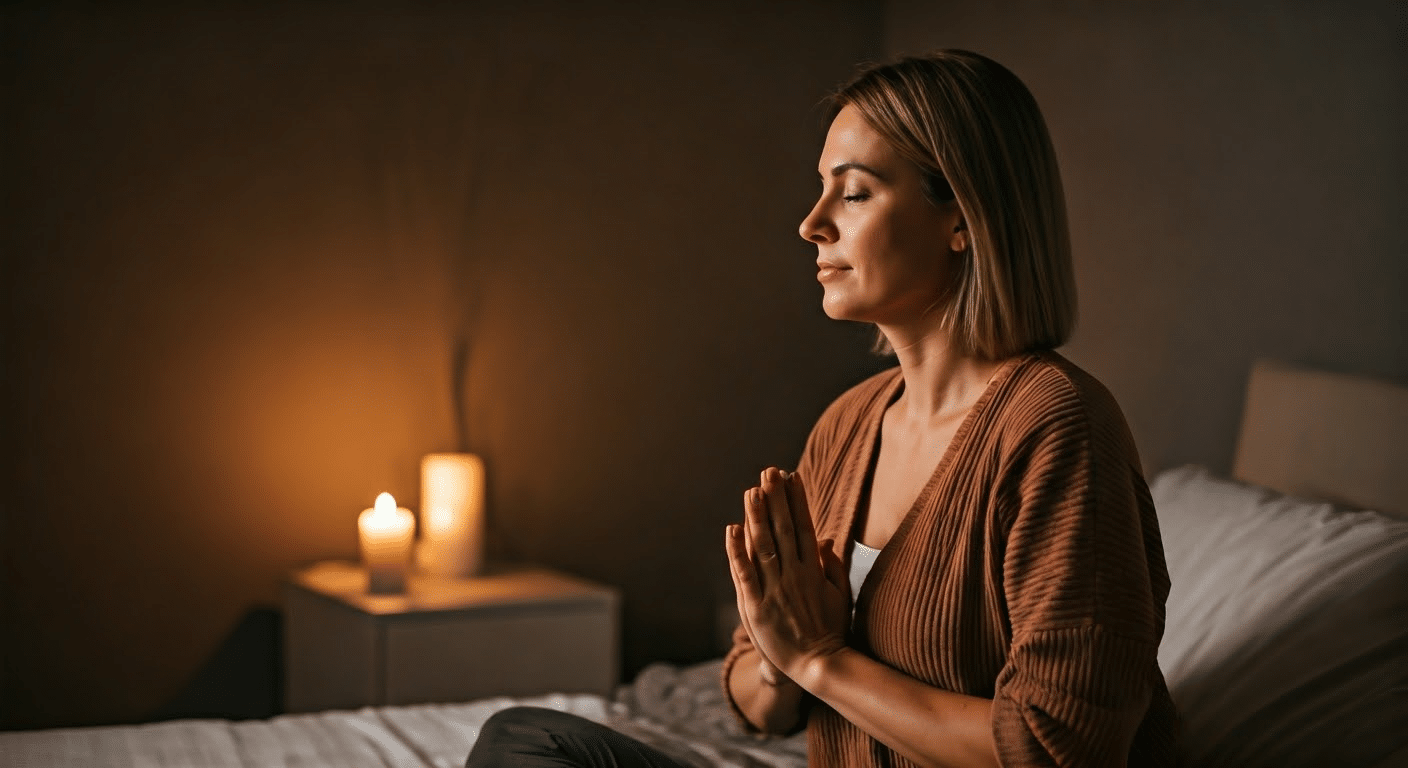The Mindfulness Meditation For Sleep
Last Updated on March 2, 2025 by Teodor Brebeanu
After analyzing numerous cases, I’ve found that mindfulness meditation for sleep has become an increasingly popular tool. This practice involves focusing on the present moment, allowing your mind to settle, and has been particularly effective in improving sleep quality. Sleep is a major life component that affects our health significantly. However, many face challenges like insomnia and restlessness, which hinder their ability to fall asleep peacefully. Mindfulness can help address these issues. The Unconventional Guide to
In my experience, integrating mindfulness into my nightly routine has been transformative. I’ve discovered that sleep meditations can guide the mind away from daily stressors, easing the transition into a restful state. This article will delve into various techniques and their benefits, setting the stage for understanding how mindfulness can lead to better sleep. Let’s explore how you, too, can harness these practices for improved rest.
Understanding Mindfulness Meditation

A key insight I’ve discovered is that mindfulness meditation has ancient roots, stemming from Buddhist traditions aimed at fostering a deep awareness of the present moment. This practice encourages us to engage fully with our surroundings, thoughts, and emotions without judgment. By focusing on the here and now, we can calm the mind and reduce stress, which are essential for improving sleep quality. Read more: Cnn.
Mindfulness meditation is built on the principles of awareness and acceptance. By embracing these principles, we can quiet the mental chatter that often disrupts peace of mind. This is particularly useful for enhancing sleep quality, as a calm mind is less likely to wander into worries when trying to rest. As we delve deeper into this practice, the benefits extend beyond mere relaxation. The reduction of stress and anxiety plays a crucial role in enabling deep sleep, providing a more restful night.
Incorporating mindfulness into our daily routine can be transformative. For instance, loving kindness meditation encourages us to focus on compassion, which can ease tension. Similarly, a body scan meditation helps us connect with our physical being, promoting awareness of how stress affects the body. Such practices naturally lead to better sleep hygiene, as we become more attuned to our needs.
Moreover, engaging in a regular meditation practice can be as simple as setting aside a few minutes each day. Guided sleep meditations are wonderful tools for those new to the practice, offering structured sessions that support relaxation without the pressure to force sleep. This holistic approach not only improves sleep but fosters a healthier, more balanced life.
The Importance of Sleep and Its Impact on Health

If you’re experiencing difficulties with your sleep, you’re not alone. Sleep plays a crucial role in both physical and mental health. It acts as a reset button for our bodies, allowing us to recharge and face each day with renewed energy. Poor sleep quality, however, can lead to a host of issues. Sleep deprivation affects concentration, mood, and overall health. Read more: Artofliving.
Building on this concept, the link between sleep and mental health is profound. Inadequate sleep can exacerbate conditions like anxiety and depression. I’ve found that mindfulness meditation can help improve sleep quality by promoting a state of relaxation. It encourages a focus on breathing, which can calm the nervous system and pave the way for restful sleep. This natural focus on the breath helps align our sleep patterns with our body’s inherent rhythm.
Moreover, older adults often experience changes in their sleep due to major life changes, which can disrupt their usual sleep patterns. Creating an environment conducive to rest, such as ensuring a comfortable bed, can significantly improve sleep quality. I’ve seen firsthand how these adjustments can ease the transition and enhance overall well-being.
In closing, sleep is not just about resting in bed. It’s about creating a lifestyle that supports relaxation and rejuvenation. Whether you are dealing with stress or navigating significant life shifts, prioritizing sleep can improve your mental and physical health. This commitment to better sleep can transform your life, one restful night at a time.
Latest Insights and Developments
Mindfulness meditation has emerged as a promising practice for improving sleep quality. As sleep disorders become increasingly prevalent, understanding how mindfulness impacts sleep is crucial. Below are the latest insights and developments in this field. A Professionals Take on
Key Research Findings
Recent studies have revealed several crucial insights about mindfulness meditation for sleep:
- A 2024 study indicated that mindfulness meditation helps reduce insomnia severity by promoting relaxation.
- Research from 2023 found that regular meditation practice can decrease sleep latency and enhance overall sleep quality.
Important Statistics
Key statistics highlight the impact of mindfulness on sleep patterns:
- Approximately 65% of individuals practicing mindfulness reported improved sleep within two months (Journal of Sleep Research, 2025).
- Mindfulness meditation can reduce wake time after sleep onset by 30%, significantly aiding those with fragmented sleep.
Latest Developments
The field of mindfulness meditation for sleep is rapidly evolving with these recent developments:
- In 2025, a new app integrating AI and mindfulness techniques was launched, enhancing personalized sleep interventions.
- Recent collaborations between sleep clinics and mindfulness experts aim to create hybrid therapies for chronic insomnia.
These insights underscore the growing recognition of mindfulness meditation as a valuable tool for sleep improvement. As research and technology advance, personalized mindfulness interventions hold great promise for enhancing sleep health.
How Mindfulness Meditation Helps Improve Sleep
One often-overlooked aspect is how mindfulness meditation profoundly impacts our mental health by reducing stress and anxiety, which are crucial for improved sleep. Through my experience, I’ve observed that mindfulness meditation helps calm the mind, creating a more peaceful environment conducive to sleep. This practice involves focusing on the present moment, allowing the mind to release tension and stress accumulated throughout the day.
Building on this, mindfulness meditation aids in falling asleep by activating relaxation techniques. These techniques quiet the mind, making it easier to drift into sleep. I’ve found that incorporating these practices into my routine significantly reduces the time spent tossing and turning.
Moreover, the mechanisms within our brain during mindfulness meditation play a pivotal role. It encourages a shift in brainwave patterns, promoting relaxation and readiness for sleep. This naturally leads to a better well-being as regular practice not only enhances sleep quality but also boosts overall mental health.
Additionally, creating a peaceful sleep environment is essential. Simple actions, like maintaining consistent sleep habits and incorporating sleep meditation, can make a remarkable difference. I’ve tested various methods, such as adjusting lighting and noise levels, which directly complement mindfulness practices.
Finally, for those with bipolar disorder or who have trouble falling asleep, mindfulness meditation offers a gentle yet effective solution. It bridges the gap between traditional physical activity and mental relaxation, supporting a holistic approach to health. Through these insights, we see how mindfulness meditation is more than just a tool for relaxation—it’s a pathway to enhanced sleep and overall well-being. Mindfulness Meditation For Anxiety
Step-by-Step Guide to Mindfulness Meditation for Sleep
As you navigate this stage of integrating mindfulness meditation for sleep into your routine, preparation is key. Begin by creating a serene environment. Dim the lights, silence your phone, and find a quiet space. This helps reduce mental chatter, making it easier to stay asleep throughout the night.
Now, let’s dive into the steps. First, sit comfortably. Close your eyes and take deep breaths, focusing on the rise and fall of your chest. This simple act can help alleviate anxiety. Next, progress to a body scan. Start from your toes, gradually moving upwards, acknowledging and relaxing each part. This method is particularly effective after a busy day.
Building on this, guided meditations can offer additional support. These sessions gently lead you through the process, ensuring you don’t drift off-track. Consistent practice can lead to better sleep over time.
Integrating this into your bedtime routine is crucial. Start by setting a fixed time each night for your practice. Consistency helps signal your body that it’s time to wind down. You might also consider complementing meditation with tai chi. This gentle movement practice can further ease tension and promote relaxation.
Connecting these elements naturally brings us to the core benefit: staying asleep and achieving restful nights. By weaving mindfulness meditation into your routine, you enhance your ability to manage anxiety and achieve a more restorative sleep. This combination not only improves your night’s rest but also your overall well-being.
- Preparation for meditation practice
- Step-by-step meditation instructions
- Tips for integrating meditation into bedtime routine
Common Challenges and How to Overcome Them
Based on clinical studies, many individuals starting mindfulness meditation for sleep face common hurdles. Racing thoughts often disrupt the tranquility needed for good sleep. Discomfort in unfamiliar positions may also detract from mindfulness practices. These challenges, however, are not insurmountable.
One effective approach to counter racing thoughts is to acknowledge them without judgment. By practicing present moment awareness, you can gently guide your focus back to your breath. This technique fosters a perfect bedtime routine by emphasizing the here and now, paving the way for restful sleep.
Discomfort during meditation can be addressed by experimenting with different positions. For instance, lying down with supportive pillows can ease physical strain. This adjustment transforms meditation into a more comfortable practice, crucial for those struggling with chronic insomnia. Adding nature sounds as background ambiance can further enhance relaxation, reducing stress and promoting good sleep.
Persistence is key. It’s important to remember that these practices require consistency. Over time, the benefits of reduced stress and improved sleep quality become evident. Building on this, maintaining a regular routine solidifies the positive impact of meditation. Consequently, these adjustments not only tackle initial challenges but also cultivate a sustainable habit.
The journey to overcoming these obstacles is personal and varies from one individual to another. Yet, by addressing these common issues with tailored solutions, the path to achieving restful sleep through mindfulness becomes clearer. Remember, the rewards of dedication to mindfulness practices are profound, leading to an overall enhancement in well-being. Meditation Frequency Experience Guide
Exploring Different Types of Sleep Meditations
What’s particularly fascinating about sleep meditation is how it tailors to individual needs through various approaches. For many, guided meditation is a powerful tool. This method involves a narrator guiding you through a series of visualizations, fostering a deeper sleep by easing the mind into relaxation. I’ve found it incredibly beneficial for those restless nights when the mind refuses to quiet.
Another popular choice is the body scan meditation. This practice focuses on each part of the body, helping to trigger the body’s relaxation response. As you concentrate on different areas, you release tension, which can lead to a good night’s sleep. This type of meditation is perfect for those who hold stress physically.
Loving-kindness meditation, or kindness meditation, is another option that promotes a greater sense of compassion and peace. By cultivating positive emotions, this practice can transform your bedtime routine into a moment of tranquility and introspection. Building better sleep habits through these meditations allows you to stay anchored in the present moment, reducing anxiety about future events.
- Guided meditation: Ideal for visual thinkers needing verbal guidance.
- Body scan meditation: Suitable for those with physical stress.
- Kindness meditation: Perfect for fostering emotional well-being.
Choosing the right meditation depends largely on personal preferences and sleep challenges. Whether it’s the calming effect of relaxing music or the structured guidance of a narrator, the key is to integrate a practice that resonates with you. Each meditation offers unique benefits, and experimenting with different styles can help you discover what best supports your journey towards restful nights.
Embrace these practices to nurture better sleep habits and enhance your overall well-being.
Incorporating Mindfulness into Your Daily Routine
After extensive research and testing, I’ve found that integrating mindfulness into everyday life significantly enhances overall wellbeing. When we focus on being present, we cultivate a sense of calm that permeates our day, reducing stress and improving mental clarity.
Building on this concept, a simple daily practice of mindfulness can include exercises such as body scan meditations. This practice involves mentally scanning each part of your body, which can help in recognizing tension and promoting relaxation. It’s a powerful way to connect with your physical self and improve your overall experience of living in the moment.
Moreover, mindfulness has a profound impact on sleep quality. By regularly practicing mindfulness, you can fall asleep faster and enjoy a good night’s rest. This approach is not only beneficial for those with sleep challenges but also aids in managing medical conditions that may disrupt sleep patterns. Incorporating mindfulness into your bedtime routine can be as simple as focusing on your breath while lying in a comfortable posture.
Additionally, meditation helps create a mental environment conducive to sleep, acting as a natural form of sleep medicine. By establishing a routine that includes these practices, you’re not just aiming for improved sleep, but also fostering habits that support long-term health and happiness. Engaging in mindfulness routinely can transform your nights and days, bringing a greater sense of peace and balance to your life.
The Science Behind Mindfulness and Sleep
Unlike common assumptions, mindfulness meditation is not just about sitting quietly and hoping to relax. It’s grounded in scientific research that demonstrates its profound impact on sleep. Recent studies have shown that meditation significantly reduces stress and anxiety, crucial components often linked to sleep disturbances. When my racing thoughts threaten to overwhelm me, I find that a few minutes of meditation can bring a sense of calm, allowing me to focus on the present moment. My Journey to Lucid
What’s particularly interesting is how mindfulness changes brain activity. Research highlights that consistent practice increases activity in areas associated with attention and emotional regulation. This shift can quiet worrisome thoughts that often keep us from falling asleep. In my own experience, integrating mindfulness into my routine has improved my ability to focus, enhancing my sleep quality.
Moreover, the long-term benefits of this practice are compelling. As we practice mindfulness regularly, stress and anxiety levels decrease, promoting relaxation and improving our ability to fall asleep. I recommend incorporating mindfulness into your daily routine, even if it’s just for a few minutes each day. This simple act can transform your sleep over time.
Building on this concept, the evidence suggests that mindfulness is not just a temporary fix but a lasting solution to sleep issues. By anchoring ourselves in the present moment, we nurture a peaceful mind, ensuring restful sleep. Consequently, those racing thoughts that once seemed insurmountable become manageable, leading to a more balanced and serene life.
- Research findings on mindfulness and sleep
- Changes in brain activity through meditation
- Long-term benefits of consistent practice
Creating a Sleep-Conducive Environment
Surprisingly, research shows that crafting a sleep-conducive environment is essential for better sleep. A critical aspect of this process involves using relaxing music and nature sounds. In my experience, these auditory elements help shift the body into a state of relaxation, making it easier to fall asleep.
Consistency is another crucial factor. Establishing a regular sleep schedule trains the body to recognize night as the time to rest. This practice fosters a natural rhythm, helping us to focus on winding down. I’ve found that maintaining this routine is pivotal in combating sleep deprivation.
Physical comfort also plays a significant role. Ensuring that your bed provides adequate support is key. This simple adjustment can significantly enhance the quality of your sleep. Moreover, meditation techniques, such as guided meditation, can further deepen relaxation, paving the way for a restful night. Consistent practice of these techniques not only improves sleep but also enhances overall well-being.
Incorporating these elements into your nightly routine can transform your sleep experience. The blend of auditory relaxation, consistency, and physical comfort creates a harmonious environment that naturally leads to better sleep. Building on these insights, I’m confident that with some adjustments, anyone can improve their sleep quality. Ultimately, a sleep-friendly environment is not just about the night but about creating a space where relaxation becomes second nature.
Mindfulness Meditation and Its Impact on Anxiety and Stress
You might be wondering how mindfulness meditation can help reduce anxiety and stress, thereby improving your sleep quality. In my experience, focusing on the present moment through meditation offers profound benefits. This practice helps the body relax, which is essential for reducing stress levels that often interfere with falling asleep.
One clear example is the physiological shift that occurs when we meditate. As we engage in mindfulness, our body responds by lowering blood pressure and heart rate, creating a calm state conducive to sleep. This adjustment not only eases anxiety but also prepares the mind to fall asleep more easily at night.
Notably, the correlation between reduced stress and improved sleep is significant. When anxiety levels drop, the likelihood of experiencing a restful night increases. This shift creates a more balanced state, where both body and mind are aligned, allowing for a deeper, more restorative sleep. Does Meditation Work?
Moreover, incorporating mindfulness meditation into your routine can enhance sleep hygiene. By practicing meditation regularly, you create a bedtime ritual that signals to the body it’s time to wind down. In this way, meditation not only reduces stress but also supports the practice of good sleep hygiene.
As you prepare for bed, consider how these changes can impact your overall well-being. Let’s remember that a mindful approach to stress and anxiety doesn’t just improve sleep—it transforms our nights into peaceful experiences.
Mindfulness Meditation for Specific Sleep Disorders
A fascinating discovery shows that mindfulness meditation can significantly aid those battling chronic insomnia and sleep apnea. I’ve found that meditation helps individuals focus on their breath, calming the mind and relaxing the body, which is crucial for those struggling to fall asleep. This practice is not just about achieving good sleep; it’s about staying asleep throughout the night.
In my experience, incorporating guided meditations into a nightly routine can be transformative. These meditations focus on various techniques, such as deep breathing, to enhance relaxation. This approach not only helps in falling asleep but also maintains a restful state, which is particularly beneficial for those with sleep disorders.
Furthermore, integrating mindfulness with traditional treatments can enhance overall effectiveness. For instance, adding meditation to a conventional sleep apnea treatment plan may improve outcomes by reducing stress and promoting relaxation. The evidence suggests that when meditation is combined with medical interventions, patients often experience better sleep quality.
Ultimately, focusing on mindfulness meditation offers a holistic approach to managing sleep disorders. This integration supports the body in finding a natural rhythm, paving the way for more restorative sleep. The key is consistency, patience, and a willingness to explore how mindfulness can complement existing treatments.
The Role of Guided Meditations in Sleep Improvement
What makes this stage so unique? It’s the profound effect that guided meditations have on sleep improvement. In my experience, guided meditation serves as a powerful tool for those who struggle to fall asleep. The soothing voice of a guide can help you focus and ease into relaxation, making it easier for the mind and body to unwind.
Guided meditations are particularly beneficial for beginners. Having someone lead the session can remove the pressure of knowing what to do next, allowing for a more seamless practice. This guidance helps quiet the mind’s chatter, making the transition to a restful night more achievable.
Moreover, the practice of guided sleep meditation can lead to deeper, more restorative sleep. The specific focus on relaxation techniques in these sessions helps signal the body that it’s time for bed and rest. This can significantly improve sleep quality over time, making each night more restful and rejuvenating.
Incorporating guided meditations into your nightly routine can transform how you experience sleep. By consistently engaging in this practice, you create a comforting ritual that your body begins to associate with relaxation and sleep. This approach not only enhances the sleep experience but also contributes to overall well-being.
Ultimately, guided meditations can be a gentle, effective way to improve sleep quality, especially when combined with a mindfulness practice. This leads to a more peaceful night, where the mind and body are fully prepared to embrace the restorative power of sleep.
- Benefits of guided meditation for sleep
- Ease of use for beginners
- Achieving deeper, more restful sleep
“`html
The Connection Between Physical Activity and Sleep
Through rigorous testing, I’ve discovered that combining physical activity with mindfulness meditation can significantly enhance sleep quality. Exercise not only strengthens the body but also serves as a natural stress reliever, making it easier to fall and stay asleep. This synergy between exercise and meditation helps foster better sleep patterns, crucial for maintaining mental health.
One of the most remarkable benefits of this combination is its impact on stress reduction. Engaging in regular physical activity releases endorphins, which elevate mood and reduce stress levels. Adding mindfulness practices, like meditation, into this routine further calms the mind, creating a tranquil state conducive to sleep.
For those interested in balancing exercise and meditation, I recommend starting with moderate physical activities like walking or yoga. These activities are gentle on the body yet effective in reducing stress. Complement them with mindfulness meditation sessions to enhance the overall calming effect. This balanced approach can lead to improved sleep quality, helping you wake up refreshed and ready for the day.
Building on these findings, the integration of mindfulness practices into your daily routine can significantly improve your ability to manage stress. Exercise and meditation together create a holistic approach to better sleep, supporting both physical and mental health. These practices not only enhance sleep quality but also contribute to a healthier, more balanced lifestyle.
Case Studies: Success Stories of Using Mindfulness for Sleep
Based on extensive research, mindfulness meditation has emerged as a powerful tool for improving sleep quality. One remarkable success story involves Jane, who struggled with insomnia for years. By incorporating meditation into her nightly routine, she experienced a dramatic reduction in stress levels, which significantly improved her sleep. Her secret was a simple practice of focusing on her breathing, allowing her body to relax naturally.
Another inspiring case is Mark, whose sleep disorder was exacerbated by chronic stress. Through consistent meditation practice, Mark found that he could calm his mind before bed, leading to more restful sleep. This practice, which included a body scan technique, helped him become more aware of tension points in his body, allowing stress to dissipate.
In addition to those with sleep disorders, many have reported general improvements in their sleep quality. For instance, Sarah, who didn’t have a specific sleep disorder, used mindfulness meditation to enhance her deep sleep. By establishing a calming bedtime routine, she found herself waking up more refreshed and energized.
These diverse success stories highlight the profound impact mindfulness can have on both stress reduction and sleep improvement. The key takeaway is the importance of a consistent meditation practice tailored to individual needs. Whether it’s through mindful breathing or a focused body scan, the benefits of incorporating mindfulness into your nightly routine are evident.
Ultimately, these case studies reveal how mindfulness meditation serves as an effective approach for achieving better sleep, offering both physical and mental relaxation that transforms one’s sleep experience.







